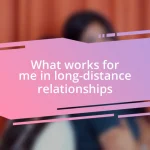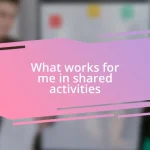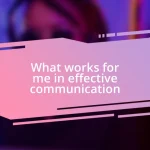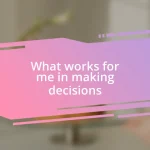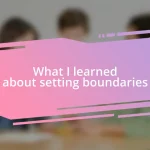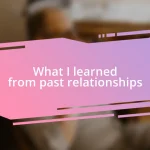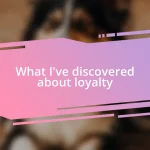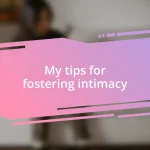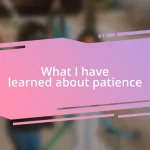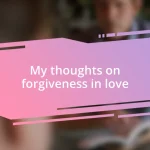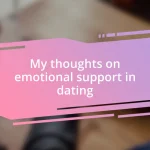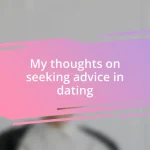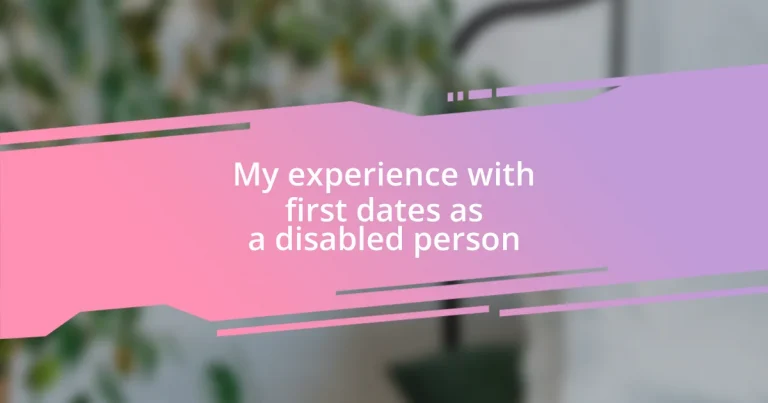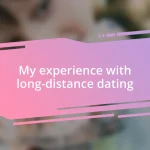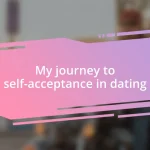Key takeaways:
- Open communication about disability can transform awkward moments into meaningful conversations, fostering deeper connections between partners.
- Preparation for dates, including choosing accessible locations and expressing personal needs, enhances comfort and leads to more authentic experiences.
- Embracing vulnerability and discussing challenges openly can create stronger bonds, encouraging empathy and understanding in the dating process.
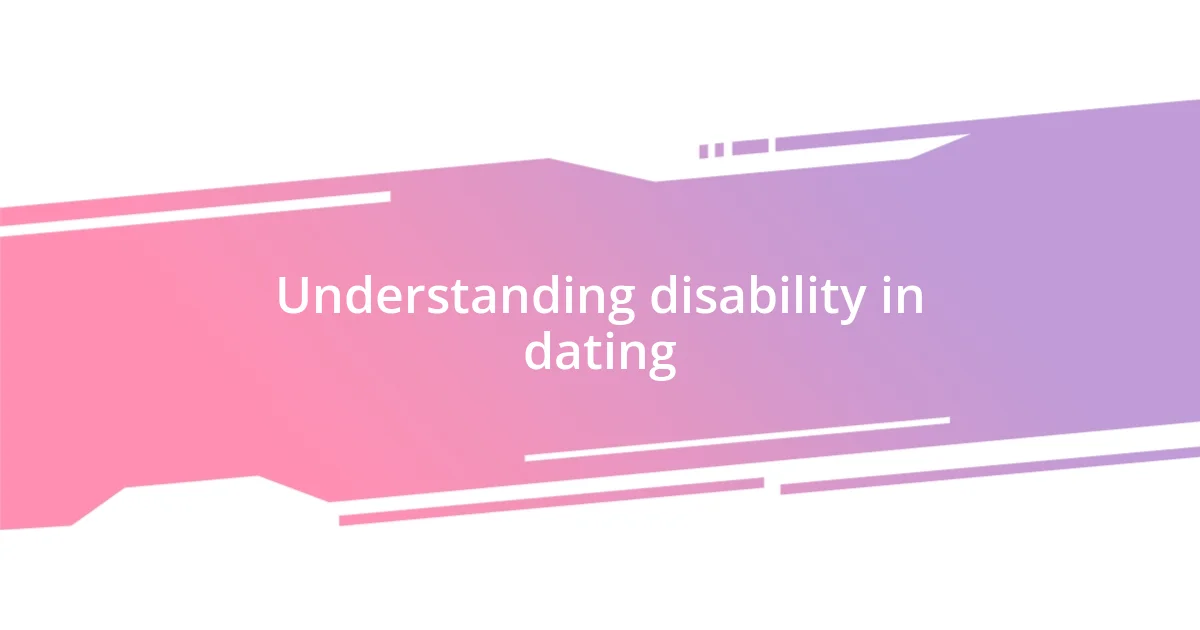
Understanding disability in dating
Dating as a disabled person often feels like navigating a minefield of misconceptions. I remember one date where my date surprised me by asking whether my wheelchair made me a less capable partner. It was an awkward moment, but it highlighted the importance of open conversations about disability and abilities.
People often assume that a disability defines a person’s identity entirely, but that couldn’t be further from the truth. I frequently find myself wanting to show potential partners that my life is rich and full beyond my disability, but it takes effort to shift the focus away from the limitations others perceive. Isn’t it interesting how sometimes, the most profound connections emerge from discussing our differences instead of avoiding them?
I’ve also noticed that many people fear saying the wrong thing, which can create a tense atmosphere on dates. One time, a date expressed concern that they might offend me by mentioning my disability. That led to a meaningful conversation about how, for me, it’s part of my life but not the whole story. It made me wonder—how can we cultivate an environment where everyone feels comfortable being authentic?
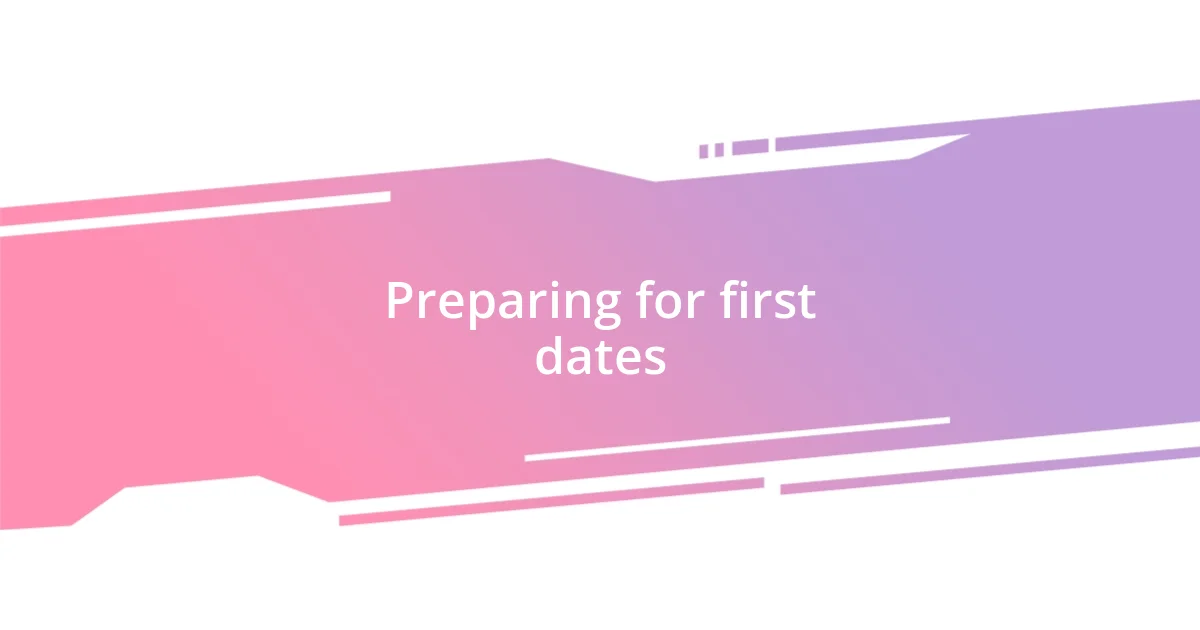
Preparing for first dates
Preparing for a first date as a disabled person often comes with unique considerations. I’ve found that taking the time to prepare not only eases my nerves but also sets the stage for a more genuine experience. One time, I chose a café with accessible seating, and this thoughtful choice really helped both of us relax. It demonstrated my awareness of the environment and paved the way for an open dialogue about comfort levels.
To make the most of the preparation process, here are some practical steps I recommend:
- Choose a suitable location: Look for venues that are accessible and comfortable for you, setting a positive tone for the date.
- Communicate openly: Don’t hesitate to share any needs you have ahead of time; this fosters understanding and eases any awkwardness.
- Dress for confidence: Wearing something that makes you feel good can boost your confidence and allow your personality to shine through.
- Have conversation starters ready: Think of interesting topics or questions to help avoid any lulls in conversation, especially around disability.
- Be yourself: Remember, it’s about connecting—embrace who you are and let your authentic self shine.
Preparing this way not only helps me feel more self-assured, but it also enhances the overall experience of getting to know someone new.
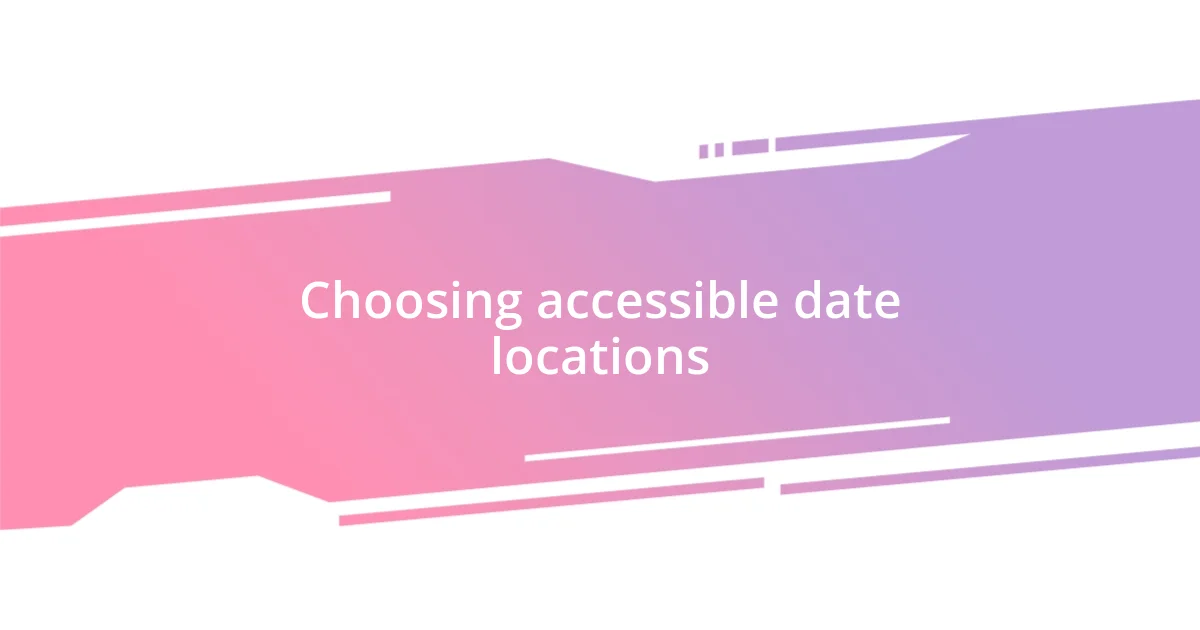
Choosing accessible date locations
Choosing accessible date locations can significantly impact how enjoyable and stress-free the experience is for both partners. I remember a time when I suggested a rooftop bar for a date, only to discover it wasn’t wheelchair accessible. We ended up having to go somewhere else, which was frustrating for both of us. Since then, I’ve made it a point to check accessibility beforehand. It’s not just about me; it shows that I care about my date’s comfort too.
Opting for accessible locations not only reflects consideration but also creates a welcoming atmosphere. I’m particularly fond of cozy restaurants that have wide aisles and accessible restrooms. On one occasion, we chose a place with a garden space, allowing us to enjoy the outdoors while ensuring ease of movement. That small detail made our conversation flow effortlessly, with no worries about navigating around cramped spaces. Isn’t it amazing how little touches like that can enhance the connection we seek on dates?
Here’s a quick comparison to highlight the types of date locations I find generally accessible versus those that often fall short:
| Accessible Date Locations | Less Accessible Date Locations |
|---|---|
| Outdoor parks with pathways | Restaurants with steps or narrow entryways |
| Modern cafes with ample space | Rooftop bars without elevators |
| Museums with ramps | Theaters with limited seating |
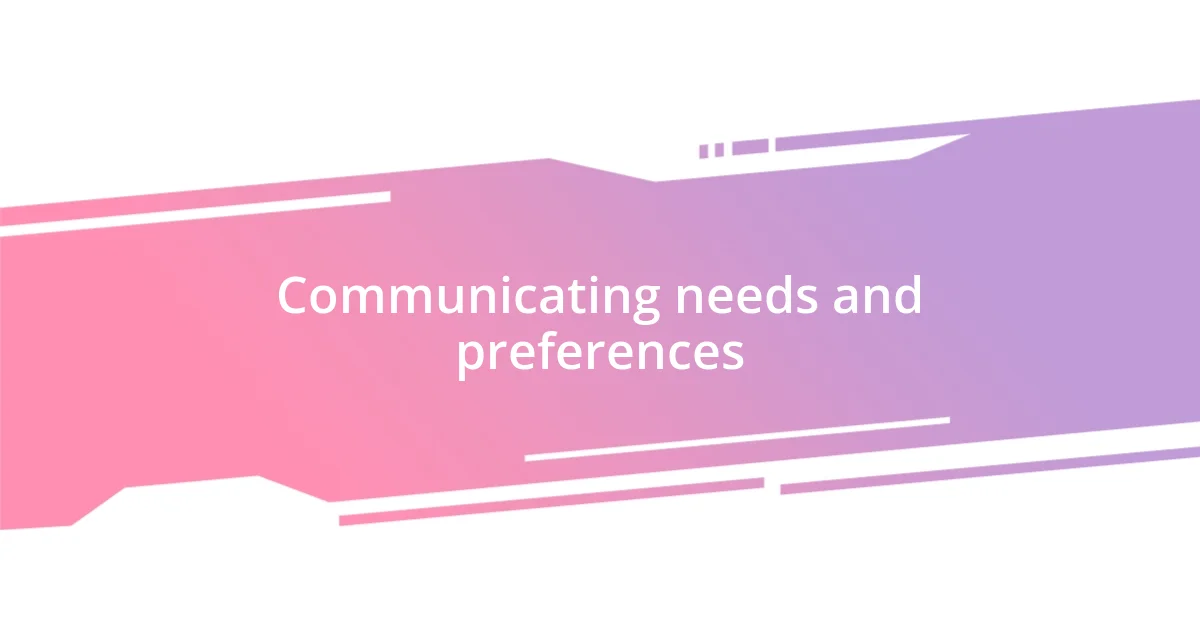
Communicating needs and preferences
Communicating my needs and preferences before a first date is something I’ve grown to value deeply. When I express what accommodations might make me comfortable, it opens the door to honest conversations. I’ll never forget when I casually mentioned needing a bit of extra time to get around. That simple exchange not only set the tone for understanding but also made it clear to my date that it was perfectly okay to ask questions.
Sometimes, I feel a little anxious about being upfront about my preferences. I remember a specific instance where I hesitated to mention my need for a quiet table because I didn’t want to seem demanding. But once I did, my date was grateful for the clarity. It made me realize that voicing my needs can foster connection rather than create distance. Can you think of a time when you were hesitant to express your preferences? I know it can feel vulnerable, but I’ve learned that it’s a vital step toward forming an authentic connection.
On the flip side, I’ve also discovered that listening to my date’s needs is equally important. I once went on a date where my partner shared her preference for sitting outside due to a sensitivity to crowded spaces. I appreciated her honesty, and it made our evening more enjoyable. By being open about our requirements, we created an environment that felt safe and inviting. Isn’t it fascinating how acknowledging each other’s preferences can truly enrich the dating experience?
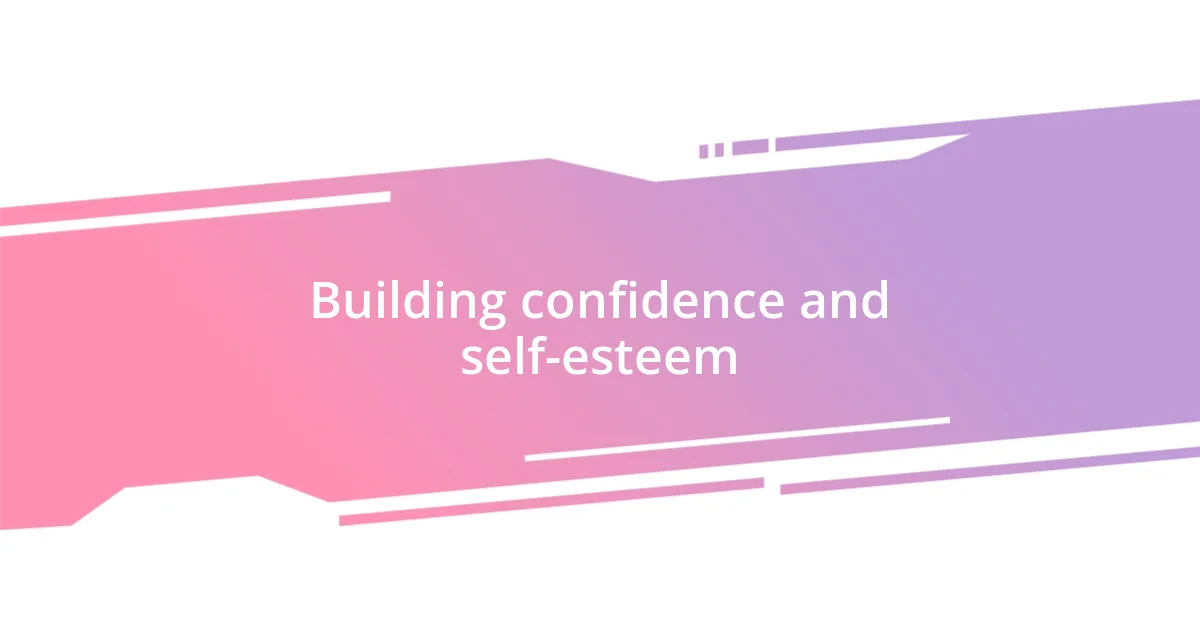
Building confidence and self-esteem
Building confidence and self-esteem has been a transformative journey for me as a disabled person, particularly when it comes to dating. I vividly remember a moment before one of my first dates—standing in front of the mirror, practicing a casual smile and reminding myself of my worth. It struck me how powerful our self-perception can be. The way we view ourselves often shapes the experiences we attract and create. Have you ever noticed how confidence can change the atmosphere of a conversation?
I’ve encountered situations where my disability felt more prominent, like the time I entered a café and noticed people staring. Initially, I felt small and insecure, but then I reminded myself of the qualities that make me unique—my humor, empathy, and passion. Embracing those aspects helped me shift my focus from feeling judged to appreciating what I bring to the table, turning anxieties into affirmations. Isn’t it remarkable how reframing negative thoughts can change our interactions?
Over time, I’ve also learned that surrounding myself with supportive friends boosts my self-esteem significantly. There was a particular night when I got ready for a date, and my friends rallied around me, offering compliments and encouragement. Their affirmations not only calmed my nerves but reignited my belief in myself. It made me understand that confidence blooms in community, where we uplift one another. How often do you take time to appreciate the support in your life? It truly can make a world of difference.
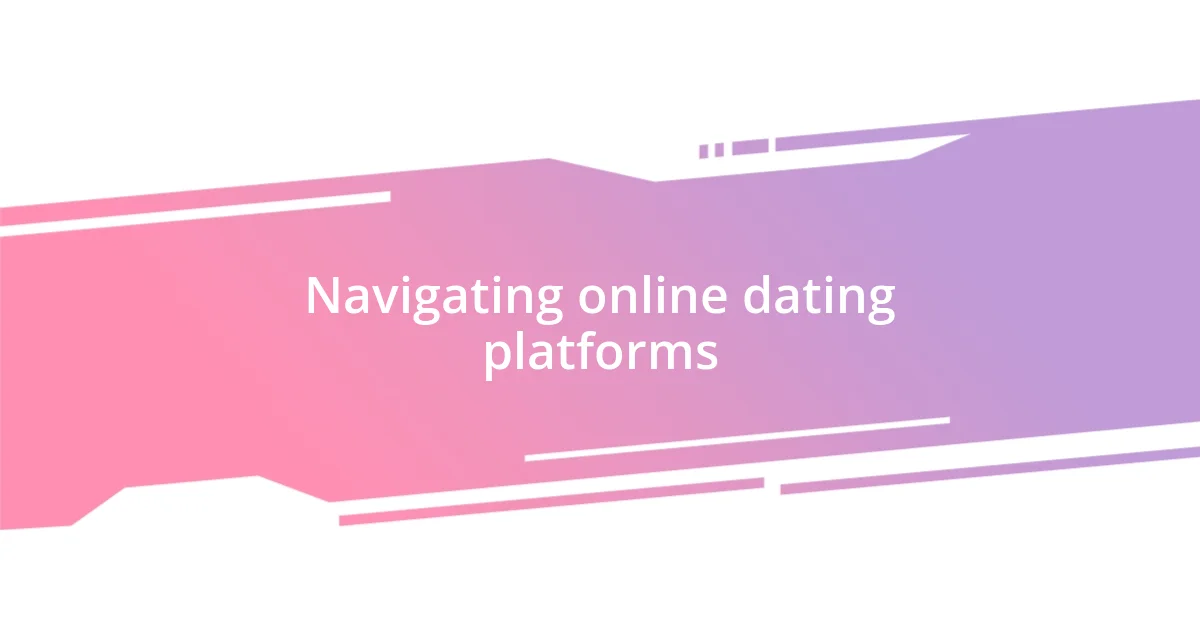
Navigating online dating platforms
Navigating online dating platforms can feel like stepping into the deep end, especially when you’re doing it with a disability. I remember setting up my profile for the first time—I spent hours thinking about which photos to choose and how to describe myself. I realized that being upfront about my disability was crucial; it was my way of filtering out those who might not understand my journey. Have you ever felt the pressure to present a polished version of yourself online? In my experience, authenticity can be more magnetic than perfection.
When I started swiping, I paid close attention to people’s bios and how they framed their own experiences. I specifically looked for language that indicated openness and understanding. There was one profile that caught my eye—someone who shared their enjoyment of deep conversations and also mentioned a love for accessible travel. Seeing that made me feel more comfortable reaching out. Have you ever been drawn to someone because of a shared value? I’ve learned that those small, relatable details can create a powerful connection before the first message is even sent.
After messaging a few potential dates, I quickly found that the key was in asking the right questions. I remember chatting with a great person who mentioned their excitement for outdoor activities. So, I brought up my mobility challenges and how it affects my enjoyment of certain activities. Instead of shying away, I found a wonderful dialogue blossoming—one where we discussed what adaptations could make our experiences more enjoyable. Isn’t it amazing how open conversation can transform a nervous exchange into an enriching discussion? The candidness not only eased my anxiety but also paved the way for a genuine connection.
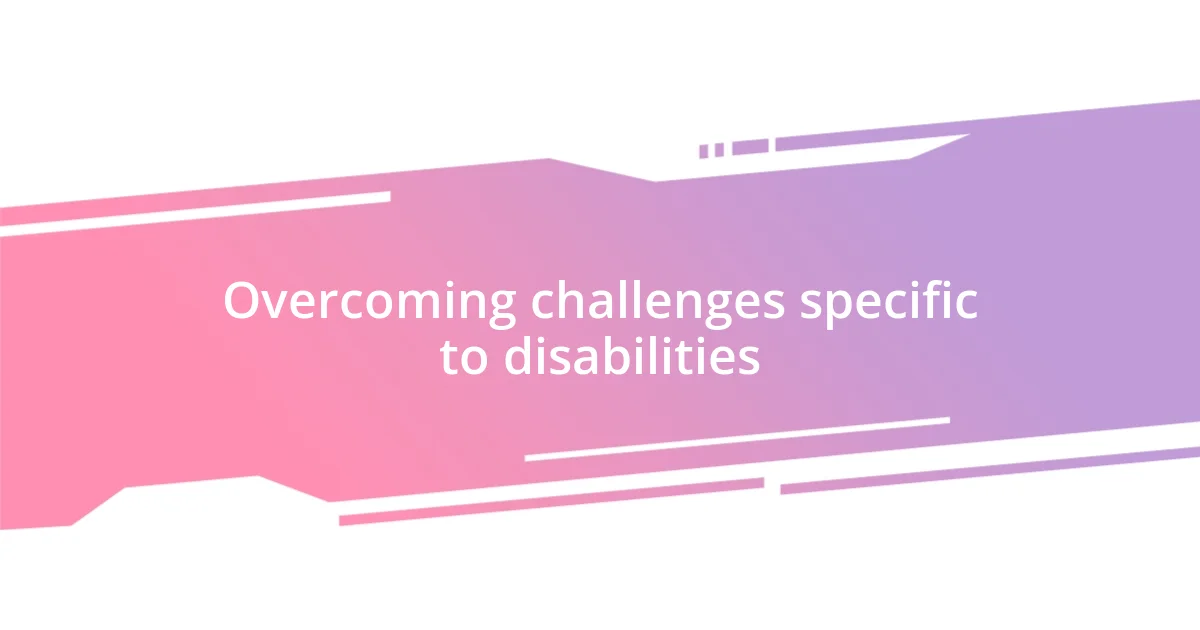
Overcoming challenges specific to disabilities
As someone who navigates the dating world with a disability, I’ve faced moments that tested my resilience. I remember one particular date where I had to explain the specific assistance I need, like using my wheelchair and requesting accessible seating. The fear of judgment was palpable, but what I discovered was surprisingly uplifting. When I embraced my needs with confidence, it often led to deeper conversations and a sense of connection that transcended surface-level interactions. Have you ever found that vulnerability can spark a bond rather than create distance?
Transportation can be a real hurdle as well, but I’ve learned to get creative. On one memorable occasion, I planned a date at a local park, which involved a bit of coordination to manage accessibility. I mapped out accessible routes and even called ahead to confirm details. While it took extra effort, I felt empowered taking charge of the situation. It reminded me that, while challenges exist, so do solutions. Have you ever turned a potential obstacle into an opportunity for connection?
I’ve also come to appreciate the power of effective communication in overcoming challenges. Like that one time I ended up chatting with a date about my disability and how it influences my daily life. Instead of an awkward silence, we stumbled upon shared experiences that brought us closer. It turns out, being open helped both of us understand each other’s backgrounds better. Isn’t it fascinating how our stories can bridge gaps and foster genuine empathy?
